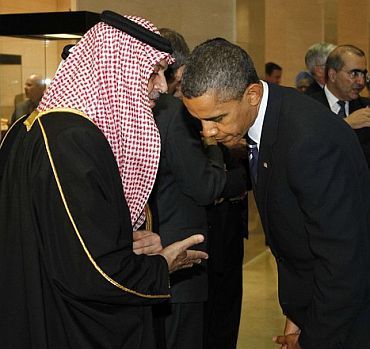 Further deterioration of the US-Saudi relationship will have geo-economic and geopolitical effects, says Nitin Pai.
Further deterioration of the US-Saudi relationship will have geo-economic and geopolitical effects, says Nitin Pai.
West Asia and North Africa are in the throes of a historic geopolitical shift. It is too early to pin down its causes, but by any reckoning the United States's march towards energy independence is an important one. The International Energy Agency expects the US -- due to its successful exploitation of shale oil reserves -- to be the world's largest oil producer in 2015. Other analysts argue that this is already the case.
As a consequence, the US no longer faces a tight oil constraint in terms of its foreign policy. This, in turn, has caused the countries of West Asia and North Africa to redo their own calculations, which could result in a much-transformed geopolitical map of the region.
Recent negotiations between Iran and the West might not have resulted in a deal, but the ice has been broken. This is a rapprochement that New Delhi could have lubricated had our foreign policy establishment shown a little more imagination in recent years (see How India can help boost US-Iran ties). Even as we allowed our regular preoccupations to limit our diplomatic canvas, Washington and Tehran moved rather rapidly from dogmatic antagonism to tentative engagement. How far this process goes will determine the politics of the region over the next decade.
Saudi Arabia, of course, is one of the most concerned parties. With oil, its primary lever of influence over the world's superpower, declining in importance, Riyadh now finds itself in an unprecedented situation. Washington has already demonstrated -- in Bahrain, Egypt and Syria -- that it is no longer inclined to subscribe to the Saudi view of what needs to be done in West Asia and North Africa.
Far worse from Riyadh's perspective is the potential transformation of the US-Iran equation. The Saudi rivalry with Iran is at once a geopolitical contest for dominance in West Asia and North Africa and a sectarian contest for influence among the world's Muslims. It is not surprising, therefore, that Saudi Arabia is finding common ground with Israel -- which has existential fears of a nuclear Iran -- to stave off a deal between Teheran and the West.
The Saudis are sparing no effort to signal their displeasure with the US in general and the Obama administration in particular. Their rejection of a seat on the United Nations Security Council was meant to be a diplomatic rebuff. In case anyone missed the point, Prince Bandar bin Sultan, Saudi Arabia's intelligence chief and the kingdom's one of the most influential foreign policy operatives, let it be known that a "major shift" in its relations with Washington was in the offing.
According to Yezid Sayigh of the Carnegie Middle East Centre, the Saudis plan "to build a rebel army of 40,000-50,000 at a cost of 'several billion dollars'" with Pakistani help. Soon after this came media reports suggesting that the Saudis would quickly seek delivery of the nuclear weapons they had ordered from Pakistan in the event Iran develops its own bomb.
Whether all this amounts to a threat by the Saudis to deter Washington from making a deal with Iran or is an indication of Riyadh's policy change is unclear. It probably is a bit of both. Whatever might be the case, the implications are serious enough for New Delhi to show a lot more interest than it has so far.
Further deterioration of the US-Saudi relationship will have both geo-economic and geopolitical effects. Riyadh could decide to invest its oil wealth and income in non-US assets. It could reduce purchases of military equipment from the US. Such moves could open up opportunities for other actors, including Europe, Russia, China and India.
If the Saudis execute the "major shift" that Prince Bandar threatened, they will seek to replace their security relationship with the US with a combination of a tighter, more overt military and nuclear partnership with Pakistan, and a greater reliance on China in international affairs. The Pakistani establishment will only be too keen to become a front-line ally of yet another benefactor with deep pockets. China, though, will have to execute a balancing act, given Beijing's own relationship with Iran.
An optimistic reading of the situation indicates that an explicit or implicit triangular nuclear deterrence relationship will emerge among Israel, Iran and Saudi Arabia. New Delhi's effort might be better directed at helping to bring about an outcome where their mutual deterrence is stable.
In the meantime, we should expect more turbulence at the international fault lines of the Saudi-Iranian tussle. Sunni militant groups in Pakistan are already engaged in a major offensive against the minority Shia population. Violence in theatres such as Syria could intensify as Saudi-supported and Pakistan-trained militants clash with pro-Iran groups. We can reliably expect the Pakistani military-jihadi complex to use its regained geopolitical leverage by messing around in Afghanistan and India.
New Delhi should convince the Saudis that being on good terms with India is in their interest and that they ought not to allow Pakistan to upset this. Contrary to popular belief, this is possible. For it to happen, though, India must get back on the path of high growth and coherent policy.
Image: US President Barack Obama with Saudi Arabia's Foreign Minister Prince Saud Al-Faisal.
The writer is co-founder and director of the Takshashila Institution, an independent think tank.











